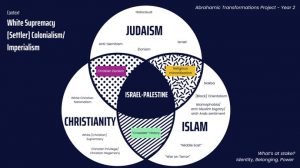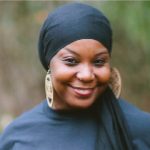With the support of a generous donor, Chicago Theological Seminary hosted a learning cohort of graduate students with representation from Jewish, Muslim, and Christian traditions during the 2022-23 academic year. Under the leadership of three scholars—Rabbi Dr. Nancy Fuchs Kreimer, Dr. Shea Watts, and Dr. Kameelah Mu’Min Oseguera—students were encouraged to build a community which unfolds through relational resilience, trust, and vulnerability by coming to know people of diverse lifestances and through sharing significant aspects of individual faith and practice.
One focus of the cohort is the profound self-discovery that unfolds in coming to know people of diverse lifestances, sharing significant aspects of our faith and practice. In this co-formative process, we also explore challenges that subvert our collective well-being, including Islamophobia and antisemitism. Students investigated the historical and present-day impact of Christian hegemony and white supremacy as intertwined systems of domination and oppression. The effect of these systems on the psyches of both white Christian people and racially & religiously minoritized individuals/groups is a spiritual issue as well as a political one––-a vital insight as we unlearn and reimagine. Through engaging in these tough but necessary conversations, students began building skills for inter/intrafaith and inter/intraracial dialogue, solidarity, well-being, and advocacy.
At the conclusion of Year 1, students expressed appreciation for the opportunity to focus on relationship-building as a priority, rather than simply knowledge exchange or performance of solidarity which tends to emphasize similarity rather than acknowledging and embracing how we navigate difference and respectful co-existence. A summative reflection from a small group of students beautifully illustrates the ways in which they were impacted by this unique cohort experience. They developed the acronym FAITH: Foundations, Aspirations, Intention, Transformation and Horizons and stated,
“Being part of such a cohort requires making a constant intention to bring our whole, authentic selves, an intention to carry out the cohort’s goals and guidelines, and an intention to ourselves to learn and grow. In bringing intentionality to this cohort, members draw closer together, to themselves, to our mission, and to the divine. Our intention also reflects our commitment to bearing responsibility and to put in the required work. While we understand that this work is continuous, we leave this cohort with new energy, inspiration, and mechanisms to do the work that lies on and beyond the horizon. We are committed to being honest about the impact of white supremacist ideologies and theologies have shaped our world views and to actively engage in the transformation of such impact. We are equipped with a healthy understanding of the need for collaborative, inclusive, interactive, and intentional work to foster transformative experiences well beyond this year. We are prepared to honor our siblings of varying backgrounds, faith practices, beliefs, and traditions in ways that were modeled for us through this cohort. We are inspired to continue to educate ourselves and others of the continual need to grow and heal together across imposed boundaries of race, class, gender, gender expressions, faith, practices, and affiliations.
Year 2 Focus: Centering Israel-Palestine
On the morning of Saturday October 7, 2023, a Palestinian resistance movement, led by the terrorist group known as Hamas, launched a surprise attack in Southern Israel, from the heavily blockaded Palestinian territory of Gaza. This attack resulted in the deaths of nearly 1,200 Israelis and the kidnapping of over 200 individuals including Israelis and foreign nationals. This attack triggered a catastrophic response by the Israeli army against the 2.2 million people residing in the Gaza strip. As of Nov 20, nearly 15,000 Palestinians have been killed, (5,000 of whom are children); schools, mosques, churches and refugee camps have been bombed, resulting in thousands more injured and displaced. Further, there have been deaths, injuries and other acts of violence inflicted upon Palestinians in the West Bank and Armenian Christians living in Jerusalem. Around the globe, antisemitism and anti-Muslim/anti-Arab bigotry is on the rise at an alarming rate.
As stewards of the Abrahamic Transformations Project, Dr. Mu’Min Oseguera, Dr. Watts, and Rabbi Nancy Kreimer sought to honor and preserve the integrity of the interfaith community we had co-created over the past year. Toward this aim, we shared the following with our students just one week after the war began: Rather than a “statement” about the war, what we humbly offer to you is an invitation. We invite you to reflect on what brings you solace in this moment of darkness? We invite you to acknowledge what is fearful, terrifying in this moment? We invite you to reflect on what you are praying for as the violence escalates? How might we join with one another as compassionate witnesses to each other’s stories and perspectives? How might we model (here in this community) that which we are longing for in the world? We do not expect, nor require that anyone has a ready answer for any of the questions we are holding. We simply sit with and name our grief, sadness and feelings of overwhelm. We lift up the power of this community to offer space for healing and affirmation. As we ponder a second year to continue with the ATP, we are reminded of just how precious and important our shared work is. We hope that you will join us in affirming life, and the commitment to carrying one another through these difficult times.
Year 2 of the Abrahamic Transformations Project will embody our collective desire to engage with one another in meaningful ways, while grounding ourselves in the relational strengths and assets that we have cultivated in Year 1. For many, engaging in interfaith dialogue on the topic of Israel-Palestine is perceived as a daunting, if not fruitless endeavor. Therefore, the focus of this year is to move toward rather than away from this daunting dialogical task. Through critical readings of primary and secondary text, monthly intrafaith AND interfaith discussions, we will explore significant aspects of the history, politics, and intergenerational trauma critical to our collective reflection on Israel/Palestine. At the end of Spring 2024, we plan to once again convene for an in-person two (2) day retreat to reflect on FAITH: Foundations, Aspirations, Intentions, Transformations and Horizons (next steps).
Our hope is that this process allows our students to model a way of being, knowing and doing which is introspective, open-hearted, honest and justice-oriented. Our hope for this unique cohort experience is that participants will end their time together prepared to be creative and resilient in this work of tikkun olam (i.e., a concept in Judaism referring to the repair of the world) to influence public perception, change policy, and truly develop the beloved community.
*The diagram below is a visual created by Dr. Oseguera to illustrate the interconnections, complexities, concepts, key events, etc included in approaching the topic of Israel-Palestine from a socio-political, relational and spiritual perspective. It is by no means comprehensive, but serves as a beginning starting point for dialogue.







